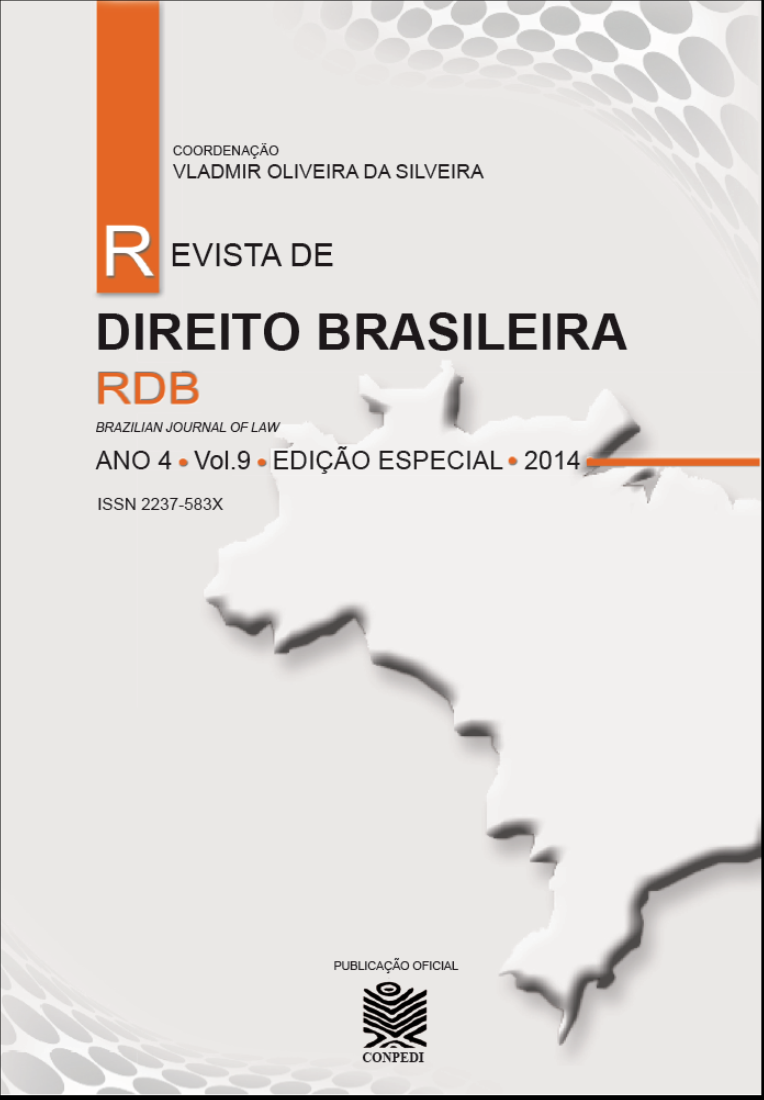Open data, transparence and philosophy of law
Main Article Content
Abstract
Thepaper shows, throughtheconsideration of theproblemsthattheexpansion of “open data” in Internet, and the use of the clearnessof theactivities of public institutionsinvolve,thedesirability of a change in theorientation of the way of thinkingthe Law, and thecontent and approaches of theScience of Lawwhich are explainedbythe professors of Law, goingtotheattributes of theLaw of the XXI century. Thechangeisrequired as theLawnow has to be takenintoaccount in interdisciplinary form, fromitsdependenceontheactivities of the “money-based, political and social developmentactors” and notjust abstract”policyadoptedbyParliament, representatives of citizens, interpreted and appliedbyjudges in theprocess, accordingtothecontent of thesamestandards and thevaluestowhichit appeals whenitwantstoapply in relationtospecific social activities.
Downloads
Article Details
• O(s) autor(es) garante(m) que a contribuição é original e inédita e que não está em processo de avaliação em outra(s) revista(s);
• A revista não se responsabiliza pelas opiniões, ideias e conceitos emitidos nos textos, por serem de inteira responsabilidade de seu(s) autor(es);
• É reservado aos editores o direito de proceder ajustes textuais e de adequação do artigo às normas da publicação.
Autores mantêm os direitos autorais e concedem à revista o direito de primeira publicação, com o trabalho simultaneamente licenciado sob a Licença Creative Commons Attribution que permite o compartilhamento do trabalho com reconhecimento da autoria e publicação inicial nesta revista.
Autores têm autorização para assumir contratos adicionais separadamente, para distribuição não exclusiva da versão do trabalho publicada nesta revista (ex.: publicar em repositório institucional ou como capítulo de livro), com reconhecimento de autoria e publicação inicial nesta revista.
Autores têm permissão e são estimulados a publicar e distribuir seu trabalho online (ex.: em repositórios institucionais ou na sua página pessoal) a qualquer ponto antes ou durante o processo editorial, já que isso pode gerar alterações produtivas, bem como aumentar o impacto e a citação do trabalho publicado (Veja O Efeito do Acesso Livre) emhttp://opcit.eprints.org/oacitation-biblio.html
References
AUER, S. R.; BIZER, C.; KOBILAROV, G.; LEHMANN, J.; CYGANIAK, R.; IVES, Z. DBpedia: ANucleusfor a Web of Open Data. TheSemantic Web. Lecture Notes in ComputerScience, v. 4825. p. 722, 2007.
BÚRCA, G.; KILPATRICK, C.; SCOTT, J. (Eds.) Critical Legal Perspectives on Global Governance: Liber Amicorum David M. Trubek. Oxford: Hart Publishing, 2014.
CARBONELL, M. Constitution’s functionality and social rights: outline of some problems. EstudiosConstitucionales, Santiago, v. 6, n. 2, p. 43-71, 2008.
COYLE, S. Modern Jurisprudence.A Philosophical Guide.Oxford: Hart Publishing, 2014.
DREIER, R. Der Begriff des Rechts.NeuejuristischeWochenschrift, p.896, 1980.
EHRLICH, E. FreieRechtsfindung und freieRechtswissenschaft.Aalen: ScientiaVerlag,. 1903.
ENGISCH, K. La idea de concreción en el derecho y en la ciencia jurídica actuales. Pamplona: EUNSA, 1968.
ESPAÑA. Ley 34/2006, de 30 de octubre, sobre el acceso a las profesiones de Abogado y Procurador de los Tribunales.BOE núm. 260, de 31 de octubre de 2006, pp. 37743 a 37747
ESPAÑA. Ley 37/2007, de 16 de noviembre, sobre reutilización de la información del sector público. BOE núm. 276, de 17 de noviembre de 2007, pp. 47160-47165.
ESPAÑA. Real Decreto 775/2011, de 3 de junio, por el que se aprueba el Reglamento de la Ley 34/2006, de 30 de octubre, sobre el acceso a las profesiones de Abogado y Procurador de los Tribunales.BOE núm. 143, de 16 de junio de 2011, pp. 61762 a
61774.
ESPAÑA. Real Decreto 1495/2011, de 24 de octubre, por el que se desarrolla la Ley 37/2007, de 16 de noviembre, sobre reutilización de la información del sector público, para el ámbito del sector público estatal. BOE núm. 269, de 8/11/2011, pp. 116296-116307.
ESPAÑA. Ley 19/2013, de 9 de diciembre, de transparencia, acceso a la información pública y buen gobierno. BOE núm. 295, de 10 de diciembre de 2013, pp. 97922- 97952.
ESSER, J. Principio y norma en la elaboración jurisprudencial del derecho privado. Barcelona: Bosch, 1961.
FOBLETS, M.C.; YASSARI, N. Legal Approachesto Cultural Diversity. Leiden: MartinusNijhoff, 2013
GADAMER, H. G. Verdad y método: fundamentos de una hermenéutica filosófica. Salamanca: Sígueme, 1977.
GALINDO, F. El acceso a textos jurídicos. Introducción práctica a la Filosofía del Derecho. Zaragoza: Mira, 1993.
__________. The communicative concept of Law. Journal of legal Pluralism and Unofficial Law, pp. 111-129, 1998.
__________. Soluciones jurídicas para las ciudades inteligentes: una perspectiva. Revista Democracia Digital e GovernoEletrônico.v. 10, pp. 26-58,2013
GALINDO, F.y otros.El concepto de Derecho. De la argumentación a la comunicación. Anuario de Filosofía del Derecho, pp. 223-254, 1993.
HABERMAS, J. Faktizität und Geltung.BeiträgezurDiskurstheorie des Rechts und der demokratischenRechtsstaats.Frankfurt: Suhrkamp, 1993
KATZ, E.D. Engineering the Endgame. Michigan Law Review, Ann Arbor, v. 109, n. 3, p. 349-386, 2010.
KELSEN, H. Teoría general del Estado. México: UNAM, 1979.
MARMOR, A.TheRoutledgeCompaniontoPhilosophy of Law New York: Routledge, 2012.
MARTIN, M. JudgingPositivism. Oxford: Hart Publishing, 2014.
MATURANA, H. El árbol del conocimiento: las bases biológicas del conocimiento humano. Santiago de Chile: Editorial Universitaria, 1988.
PERELMAN, C. La lógica jurídica y la nueva retórica. Madrid: Civitas, 1979.
ROBLES, G. Teoría del Derecho. Madrid: Thomson Civitas, 2010.
UNION EUROPEA. Directive 2003/98/EC of the European Parliament and of the Council of 17 November 2003 on the re-use of public sector information.Official Journal of the European Communities L 345, 31/12/2003, pp. 90-96.
UNION EUROPEA. Directive 2013/37/EU of the European Parliament and of the council of 26 June 2013 amending Directive 2003/98/EC on the re-use of public sector information. Official Journal of the European Communities L 175, 27/06/2013, pp. 1-8.
VIEHWEG, T. Topik und Jurisprudenz.München: Beck, 1974.





